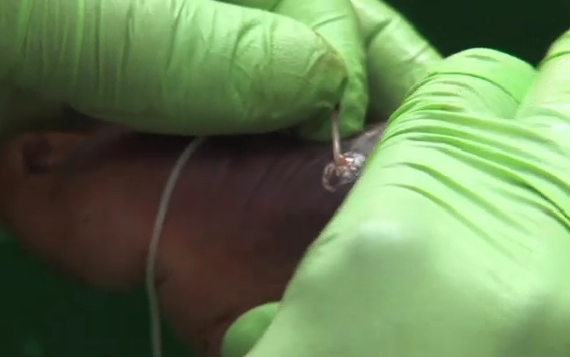NewsDesk @bactiman63
The Carter Center announced today that in 2022, only 13 human cases of Guinea worm disease were reported worldwide.

Image/Video Screen Shot
The provisional figure is the lowest annual case total ever reported. When The Carter Center assumed leadership of the global Guinea Worm Eradication Program in 1986, about 3.5 million human cases occurred annually in 21 countries in Africa and Asia.
The record low case count delighted former U.S. President Jimmy Carter, who co-founded The Carter Center in 1982 with his wife, former First Lady Rosalynn Carter.
“Rosalynn and I are pleased with this continued advance toward eradicating Guinea worm disease,” President Carter said. “Our partners, especially those in the affected villages, work with us daily to rid the world of this scourge. We are heartened that eradication can be achieved soon.”
The 13* cases in 2022 mark a 13% decline from 2021, when 15 cases were reported. (*All figures are provisional until officially confirmed, typically in March.) Guinea worm is poised to become the second human disease in history to be eradicated, following smallpox, and the first without a medicine or vaccine. Community-based and innovative behavior change and local mobilization are the key drivers of success.
Guinea Worm Eradication Program Director Adam Weiss said: “We continue to study ways to defeat and prevent this infection. Community members, ministries of health, and our partners are working with us to implement interventions that are effective, including research to find innovative solutions. We won’t stop until the last Guinea worm is gone.”
Subscribe to Outbreak News TV on YouTube
During 2022, six human cases of Guinea worm disease were reported in Chad. Five human cases were reported in South Sudan, one in Ethiopia, and one in the Central African Republic, which remains under investigation (cases can be imported from endemic to non-endemic countries).
Guinea worm infections in animals were down 21%: Chad reported infections in 605 animals, Mali reported 41, Cameroon 27, Angola seven, Ethiopia three, and South Sudan one. The worms that infect animals are the same species (D. medinensis) as those that infect humans; therefore, eradication requires stopping infections in both.
It was also announced that the Democratic Republic of the Congo sought and received certification from the World Health Organization that it had eliminated Guinea worm disease. The DRC had not reported a case of the disease since 1958.
For a disease to be declared eradicated, every country in the world must be certified free of human and animal infection, even countries where transmission is never known to have taken place. To date, the WHO has certified 200 countries free of Guinea worm; only six have not been certified. After three consecutive years of indigenous transmission, Angola was added to the list of endemic countries in 2020; however, the country reported zero human infections in 2021 and 2022. Cameroon was certified by the WHO as Guinea worm-free in 2007; that country reported one case in 2019 and one in 2020 (both likely imported from Chad) but is not endemic because it has not had three years of indigenous transmission.
Guinea worm disease is usually contracted when people consume water contaminated with tiny crustaceans (called copepods) that eat Guinea worm (Dracunculus medinensis)
Guinea worm is poised to be the second human disease to be eradicated, after smallpox
Guinea worm disease: ‘Dogs are now the key impediment to eradicating this dreadful human disease’
Guinea worm disease resurfaces in South Sudan
Jimmy Carter: ‘I’d like for the last guinea worm to die before I do’

